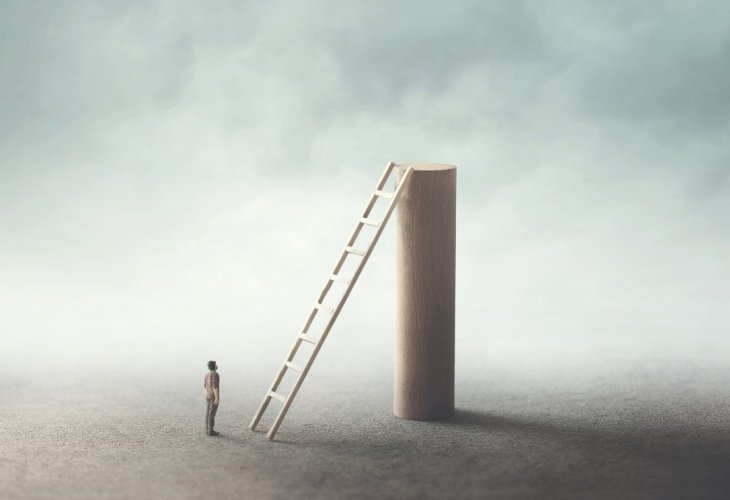Personality Development
From Fear to Freedom: Breaking the Inner Boundaries
How courage transforms limitations into growth and unlocks the hidden power within.
 (Photo: shutterstock)
(Photo: shutterstock)Naturally, we all seek a peaceful and calm life, free of challenges and difficulties. Our sages tell us that our forefather Yaakov "sought to dwell in serenity," but the troubles of his son Yosef came upon him.
Everyone has their own struggles, tests, and hardships. In fact, Chazal say that someone who goes through 40 days without any suffering- not even the smallest discomfort- may not be a good sign, because perhaps that serenity is in place of his share in the World to Come. Sometimes, instead of asking Hashem for an easy life, it’s better to ask for the strength, tools, and wisdom to deal well with the life He gave us. One of the key qualities needed is courage.
When we fear the challenges life throws at us, we feel small in the face of them. But if we summon the courage, we’ll realize we’re not as weak as we think, the difficulty isn’t as unbearable as it seems, and a better future is possible even after we’ve faced a tough situation. There is life after the struggle! We need to overcome the barrier of fear, and to realize that this fear is playing out in our minds, but is not necessarily based on reality.
If we pay attention, we’ll notice that fears create a never-ending cycle. A person afraid to speak in public for example, finds himself staying silent or avoiding social situations altogether. Each time he avoids it, he feels bad about himself, reinforcing the fear, and setting up the same pattern for the next time. Avoidance tells the brain: “Yes, this is indeed something to be afraid of.”
Courage vs. Fear
Avoiding our fears doesn’t make them go away- on the contrary, they stay with us and grow stronger. A person who lacks the courage to face fear begins to imagine all the worst-case scenarios.
Before meeting people, he tells himself he’ll never be able to express himself clearly, and he pictures himself standing silently while everyone else talks- or worse, he imagines people laughing at what he says.
These thoughts, and the emotional poison they bring, haunt him even if he escapes the situation. The only way to break this cycle is to shatter the fear with courage, and take a new step that opens the door to a positive experience. That one experience can shift the entire inner narrative.
Our fears serve as personal boundaries and they mark the lines we believe we cannot cross. Often, those lines aren’t based on truth, but simply on territory we’ve never dared to enter. The first try therefore feels intimidating because it’s uncharted ground.
Indeed, some fears are necessary. The fear of hurting another person is a positive force, and acting with “courage” in such cases would actually be harmful. But many of our fears are irrational and unfounded, and these are the ones worth challenging. Fears such as the fear of public speaking, meeting new people, or trying something unfamiliar, often do more harm than good. They hold us back from success.
People who are paralyzed by fear treat it like a stop sign: “Caution- do not proceed.” But those who grow through it acknowledge the fear, recognize the boundary, and then step beyond it. For them, fear becomes a signal that there is growth waiting on the other side.
Fears Limit Us
In parshat Vayetze, we read of our forefather Yaakov's dream of a ladder with angels ascending and descending. The Midrash (Tanchuma) teaches that Hashem showed him the spiritual "princes" of the empires of Babylon, Persia, Greece, and Edom rising and falling on the ladder. Then Hashem told Yaakov to climb the ladder as well. But Yaakov was afraid and said, “Just as they ascend and then fall, so too will I fall.” Hashem responded: “If you go up, there will be no falling for you.” But Yaakov didn’t trust and therefore didn’t ascend.
The Midrash explains: Hashem told him that if he had believed and climbed, he would never have fallen. But because he didn’t believe, his descendants would now be subject to these empires, under their control and burdens.
What was the root of Yaakov’s hesitation? As the great Rabbi Baruch Mordechai Ezrachi explains: Yaakov didn’t doubt Hashem-Heaven forbid. Rather, he doubted himself. He didn’t believe his spiritual strength was fundamentally different from that of the other nations, and so he measured himself by their standard.
The result was measure for measure. Because he saw himself through the lens of others’ limits, his descendants became subject to those same limitations.
Fear holds a person back, limits their ambitions, their efforts, their tefillot (prayers), their learning, and most of all, it limits their belief in what they’re capable of achieving.
Fear stops a person from daring to try, and prevents new ideas and new experiences. When we act from a place of inner strength and courage, we discover within ourselves a renewal, a vibrancy, and a power we never knew we had.

